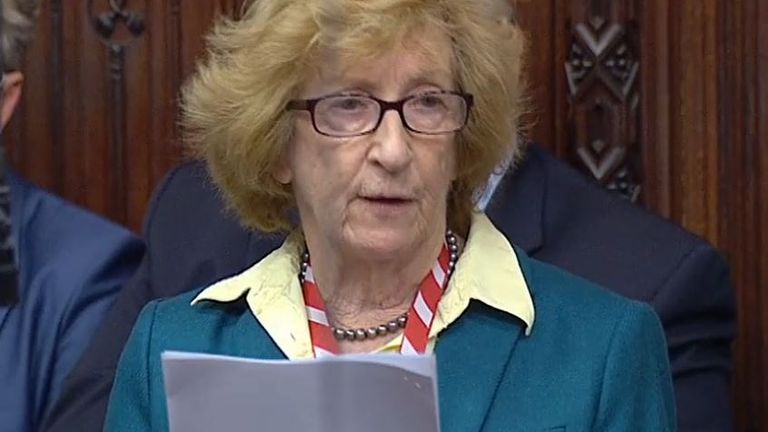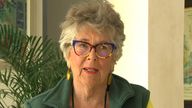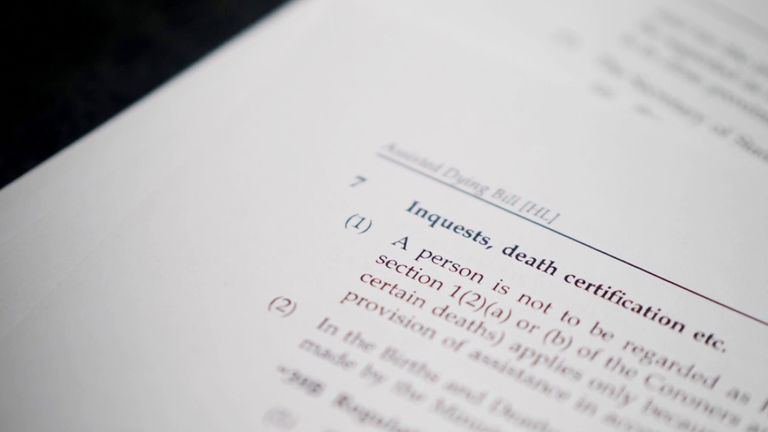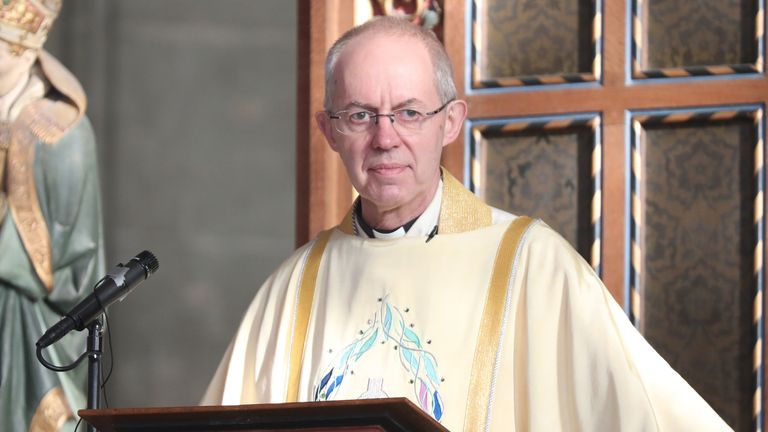Former MP Frank Field reveals terminal illness as he backs assisted dying law during Lords debate
Crossbench peer Lord Field, who represented Birkenhead for 40 years, revealed he has recently spent time in a hospice.
Friday 22 October 2021 15:18, UK
Former MP Frank Field has backed a bill that would allow assisted dying as he revealed his terminal illness.
Now a crossbench peer, Lord Field formerly represented Birkenhead as a Labour MP for 40 years before resigning the whip in 2018.
He then lost his seat in the 2019 election when standing as an independent candidate.
Peers are debating a new law in the House of Lords which would pave the way for those with a short time left to live to be able to determine when they die, as long as two doctors agree that the person is mentally competent, has fewer than six months left to live, and actively wants the right to choose.
The process would also be overseen by a High Court judge.
Lord Field told peers he had recently been in a hospice and was not well enough to attend the debate.
Fellow crossbench peer Baroness Meacher, who is leading the bill, read a short statement on Lord Field's behalf that she said colleagues might find "a little surprising".
She said Lord Field asked her to read out a short statement, which read:
"I have just spent a period in a hospice and I am not well enough to participate in today's debate. If I had been, I would have spoken strongly in favour of a second reading.
"I changed my mind on assisted dying when an MP friend was dying of cancer and wanted to die early before the full horror effects set in but was denied this opportunity.
The end of Lord Field's letter read: "I hope the House will today vote for the Assisted Dying Bill."
Lord Field was elected as an MP in 1979 and upon his departure in 2019, was one of the longest serving members of the House of Commons.
He served as minister of welfare reform in Tony Blair's Labour government and then later chaired the influential Work and Pensions Select Committee from 2015.
Lord Field resigned the whip in 2018 over the issue of anti-Semitism, adding that Labour was "increasingly seen as a racist party"
He sat as an independent before standing in the 2019 election as a member of the Birkenhead Social Justice Party and losing his seat.
Elsewhere in the Lords debate, Archbishop of Canterbury, the Most Rev Justin Welby, said there is "unanimity" on the benches of the bishops that the law on assisted dying "does not need to be changed".
He told the Lords: "Sadly, I believe this bill to be unsafe. As a curate and parish priest I spent time with the dying, the sick and the bereaved. I still do. All of us have personal experience. I have as well.
"We know that the sad truth is that not all people are perfect, not all families are happy, not everyone is kind and compassionate. No amount of safeguards can perfect the human heart, no amount of regulation can make a relative kinder or a doctor infallible.
"No amount of reassurance can make a vulnerable or disabled person feel equally safe, equally valued, if the law is changed in this way.
"All of us here are united in wanting compassion and dignity for those coming to the end of their lives. But it does not serve compassion if by granting the wishes of one closest to me, I expose others to danger.
"And it does not serve dignity if in granting the wishes of one closest to me, I devalue the status and safety of others. I hope your Lordships will reflect, and while recognising the good intentions we all share, resist the change this bill seeks to make."
The arguments for and against are controversial and complex but Scotland could lead the way in navigating them if a vote on assisted dying goes ahead there in around 18 months' time.
Campaigners believe the vote could pass, putting Scotland in line to be the first part of the UK to allow people to choose to die if they are terminally ill.
For campaigners, that decision would be welcome, as they believe it would pave the way for a law change in England and Wales too.
Downing Street has said it will not take a view on the matter of assisted dying.
A No 10 spokesperson said told reporters on Friday: "This is a matter of individual conscience. Any change in the law is for Parliament to decide rather than government policy."










